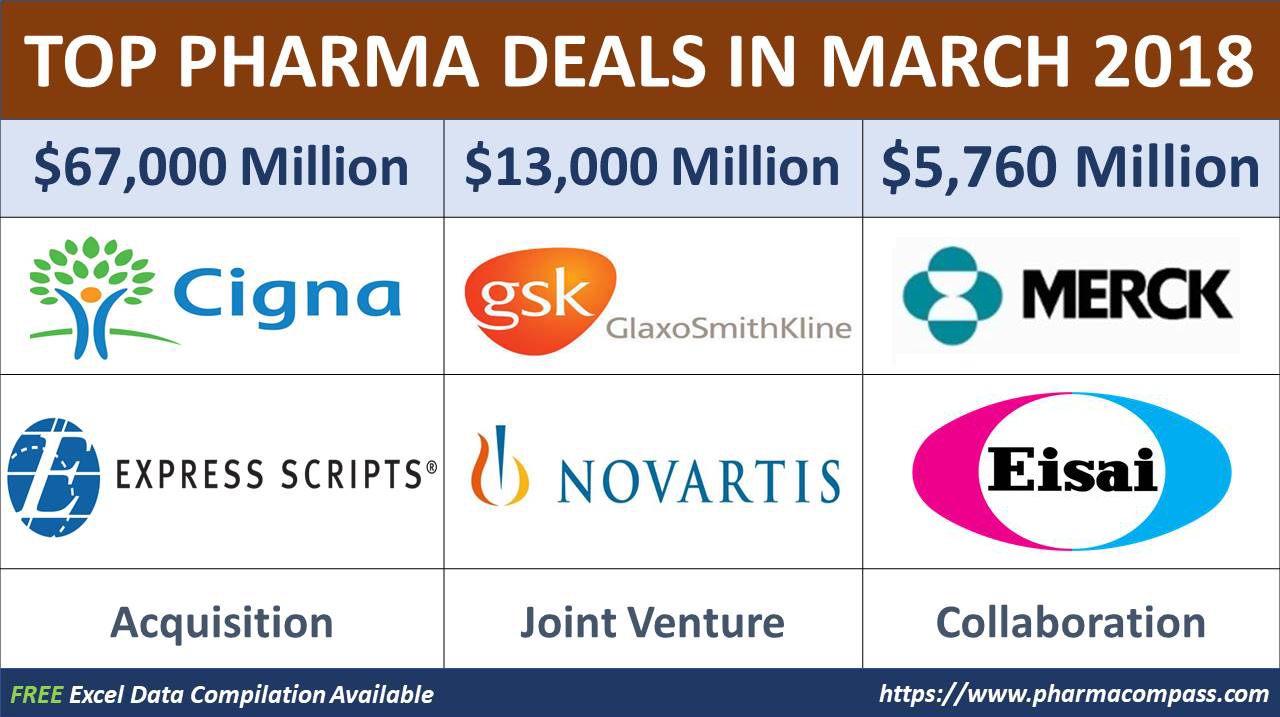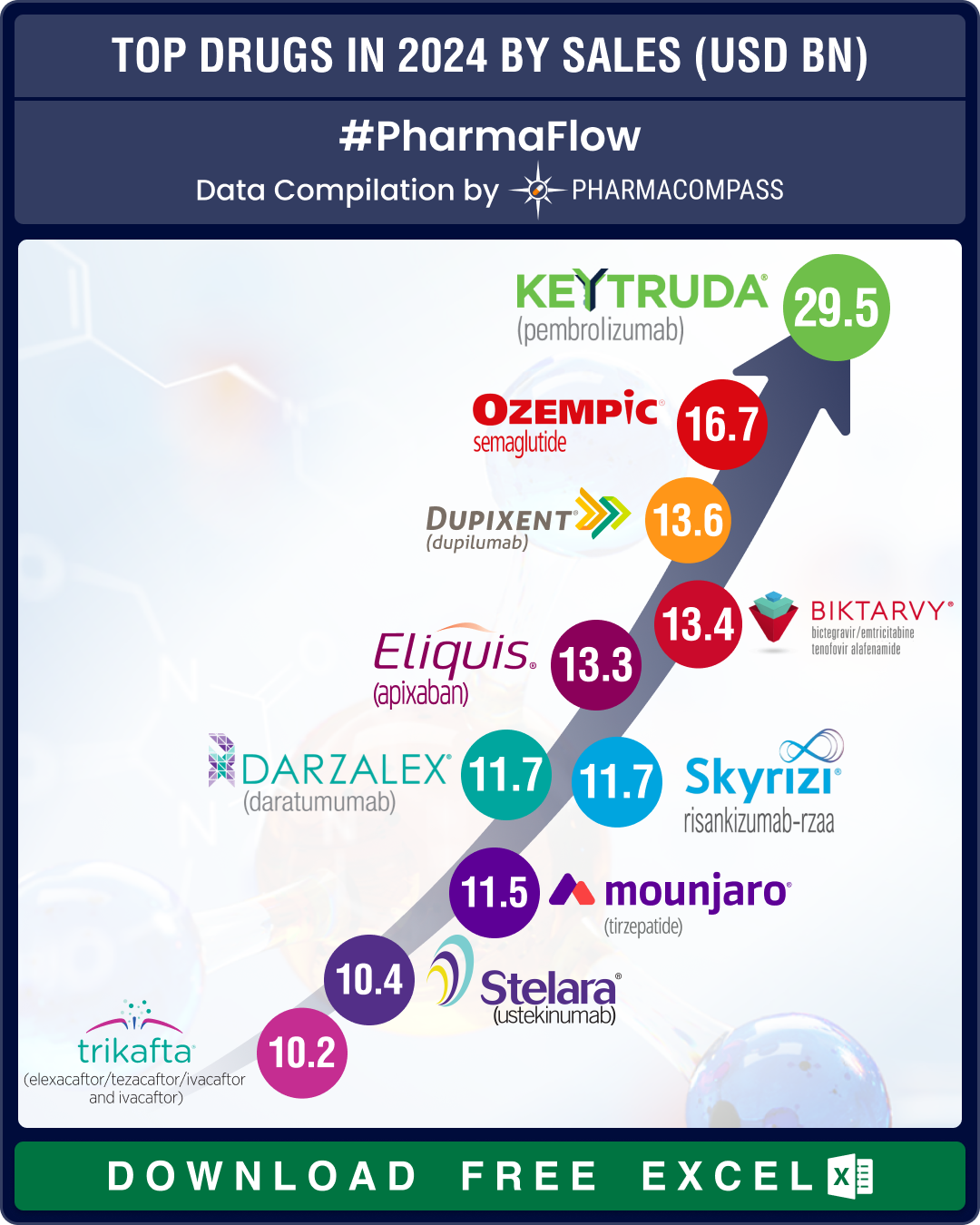
If the first two months of 2018 saw pharma and biotech firms receive more money than what all biotech companies raised throughout 2013, March witnessed the biggest takeover transaction of the year so far — health insurer Cigna Corporation acquired pharmacy benefit manager (PBM) Express Scripts Holding for around US$ 67 billion.
Healthcare shakeout
in the United States continues
As part of a shakeout in healthcare that has indeed gathered momentum in the United States, primarily in response to the growing frustration over drug pricing, health insurer Cigna Corporation has agreed to buy pharmacy benefit manager (PBM) Express Scripts Holding for around US$ 67 billion.
Click here to view the major deals in March 2018 (FREE Excel version available)
As of 2017, Express Scripts is the largest of the remaining independent PBMs. The deal would give the two companies substantial bargaining power over drug prices in the US.
Healthcare spending has been rising rapidly, accounting for an estimated 18 percent of the US economy in 2017. PBMs, such as Express Scripts, negotiate drug benefits for insurance plans and employers.
The medical supply chain has become cumbersome. Insurers, PBMs, drug distributors, pharmacies, and large medical groups — all get a cut of the profits from caring for patients. Bringing these businesses under one roof could streamline costs and improve care.
The deal could help Cigna compete with players like CVS Health Corp and UnitedHealth Group Inc. The former recently acquired Aetna Inc. for around US$ 69 billion, linking its pharmacies and drug-benefit plans with the insurer’s coverage.
There are lots happening in the PBM space. In March, Andrew Witty, former CEO of GlaxoSmithKline who retired from the British drug major a year back, announced he was taking a leadership role in managing drug benefits in one of the largest, fastest growing outfits in the US.
Click here to view the major deals in March 2018 (FREE Excel version available)
Witty has been named the new CEO of UnitedHealth’s Optum division, a PBM group and healthcare analytics company. Optum has 140,000 staffers around the world. It earns roughly half of UnitedHealth’s revenue (which was US$ 201 billion in 2017) from its three key subsidiaries — OptumHealth and OptumInsight as well as OptumRx.
Merck continues its
cancer drug deal making
Japan’s Eisai Co and US-based Merck & Co announced a potential multibillion-dollar deal to develop and sell Eisai’s cancer drug Lenvima, which is already approved in dozens of countries as treatment for thyroid cancer and advanced kidney cancer (when used along with another medicine).
As per the deal, the Japanese drugmaker could potentially receive up to US$ 5.76 billion if it proves a success. This includes an upfront payment of US$ 750 million. The remaining US$ 5.01 billion will be paid by Merck for development achievements and sales milestones, a joint statement said.
Merck will be entitled to half of all global Lenvima sales revenue, even for its already approved uses for thyroid cancer and advanced kidney cancer.
The deal is similar to a multibillion-dollar oncology collaboration Merck struck with AstraZeneca Plc for its cancer drug Lynparza last year.
Click here to view the major deals in March 2018 (FREE Excel version available)
Ionis buys back into company it spun-off
less than a year ago
Akcea Therapeutics, a biotech company focused on rare diseases caused by lipid disorders, was founded in 2015 as a subsidiary of Ionis Pharmaceuticals.
Its drug pipeline of four drug candidates were developed using Ionis’ technology and its most advanced drug was volanesorsen, a drug developed to treat familial partial lipodystrophy, or FPL.
A year ago, Akcea was spun out of its parent as it filed an initial public stock offering (IPO) to drive forward the FDA approval for its lead drug which is expected by mid-2018.
Last month, Ionis announced that it has signed an exclusive, worldwide licensing deal with Akcea related to two of its other drugs - inotersen and AKCEA-TTR-LRx, formerly IONIS-TTR-LRx.
The total milestone payments associated with this deal are $1.3 billion while the transaction could make Ionis eligible for up to $1.7 billion, plus profit-sharing payments.
Click here to view the major deals in March 2018 (FREE Excel version available)
Interim Lundbeck CEO’s billion-dollar buy
Denmark-based H. Lundbeck announced it was acquiring Prexton Therapeutics for US$ 123 million. Lundbeck is also committing an additional US$ 1 billion in milestones — with more than half of that tied to sales goals.
Prexton Therapeutics was formed as a spin-off from Merck in 2012.
The acquisition has a mid-stage Parkinson’s drug— foliglurax — at its core. The drug is in Phase II testing for the symptomatic treatment of Parkinson’s disease and dyskinesia, including Levodopa Induced Dyskinesia (LID). First data from the ongoing clinical Phase II program is expected to be available in the first half of 2019, the company said.
Click here to view the major deals in March 2018 (FREE Excel version available)
Anders Götzsche, the interim CEO of Lundbeck, said the acquisition will provide Lundbeck full control of the future of foliglurax. “Foliglurax addresses high unmet needs with its potential indication in Parkinson’s fitting perfectly within Lundbeck’s core areas and this treatment option also appears to be highly interesting for patients, physicians and payers,” Götzsche said.
Click here to view the major deals in March 2018 (FREE Excel version available)
The Phase II trial, which began in 2017, will add foliglurax to standard care of treatment for Parkinson’s disease, which includes drugs like levodopa. The primary goal of the Phase II trial is to assess efficacy, safety and tolerability of foliglurax in reducing motor complications of levodopa therapy in patients experiencing end-of-dose wearing-off and LID.
GlaxoSmithKline
doubles down on OTC
Over the past few months, there has been a lot of speculation around who will acquire Pfizer’s consumer health division auction has been the subject of a lot of speculation over the past few months. Last month Reckitt Benckiser pulled out of the race and British drug major GlaxoSmithKline was considered the leader in the race for the division. However, GSK too withdrew from the deal talks.
While there was news that Glaxo had made a final bid valuing Pfizer’s over-the-counter (OTC) treatments at about US$ 15 billion to US$ 20 billion, GSK announced it had reached an agreement with Novartis to acquire full ownership of its consumer healthcare business.
GSK will buy out Novartis’ 36.5 percent stake in a joint venture worth US$ 13 billion (£9.2 billion).
Click here to view the major deals in March 2018 (FREE Excel version available)
With this acquisition, GSK is in full control of a joint venture that owns successful OTC products like Sensodyne toothpaste, Panadol headache tablets and Nicotinell patches.
In 2017, the business reported sales of US$ 11 billion (£7.8 billion).
Japan’s Fujifilm bets on the market for cell culture media
Irvine Scientific Sales Company (ISUS) and IS Japan (ISJ), two companies specializing in cell culture media were acquired last month for $800 million by Japan’s Fujifilm.
In recent years, culture media has received increased interests as it contains the nutrients required for the growth and proliferation of cells essential for cell culturing in the R&D and manufacturing of biopharmaceuticals and regenerative medicine products.
Most importantly, the quality of the culture medium can influence the quality and efficiency of cell culturing.
Click here to view the major deals in March 2018 (FREE Excel version available)
“The market for cell culture media is expanding following the dramatic growth in the demand for biopharmaceuticals centered around antibody drugs and the increasing need for treatments using cells, and its annual growth is expected to be approximately 10% going forward,” the company said in its official announcement.
Click here to view the major deals in March 2018 (FREE Excel version available)
Our View
The first quarter of 2018 has shown a relentless rise in dealmaking as an outcome of increased liquidity in the financial markets, new technological breakthroughs, dwindling new drug pipelines of major pharmaceutical companies, an aging population along with rising health consciousness among consumers is expected to further propel dealmaking in the world of pharmaceuticals.
With Pfizer always on the lookout, the upcoming quarter may just eclipse the records we’ve seen set in the first three months of the year.
Click here to view the major deals in March 2018 (FREE Excel version available)
The PharmaCompass Newsletter – Sign Up, Stay Ahead
Feedback, help us to improve. Click here
Image Credit : TOP PHARMA DEALS IN MARCH 2018 by PharmaCompass is licensed under CC BY 2.0
“ The article is based on the information available in public and which the author believes to be true. The author is not disseminating any information, which the author believes or knows, is confidential or in conflict with the privacy of any person. The views expressed or information supplied through this article is mere opinion and observation of the author. The author does not intend to defame, insult or, cause loss or damage to anyone, in any manner, through this article.”






